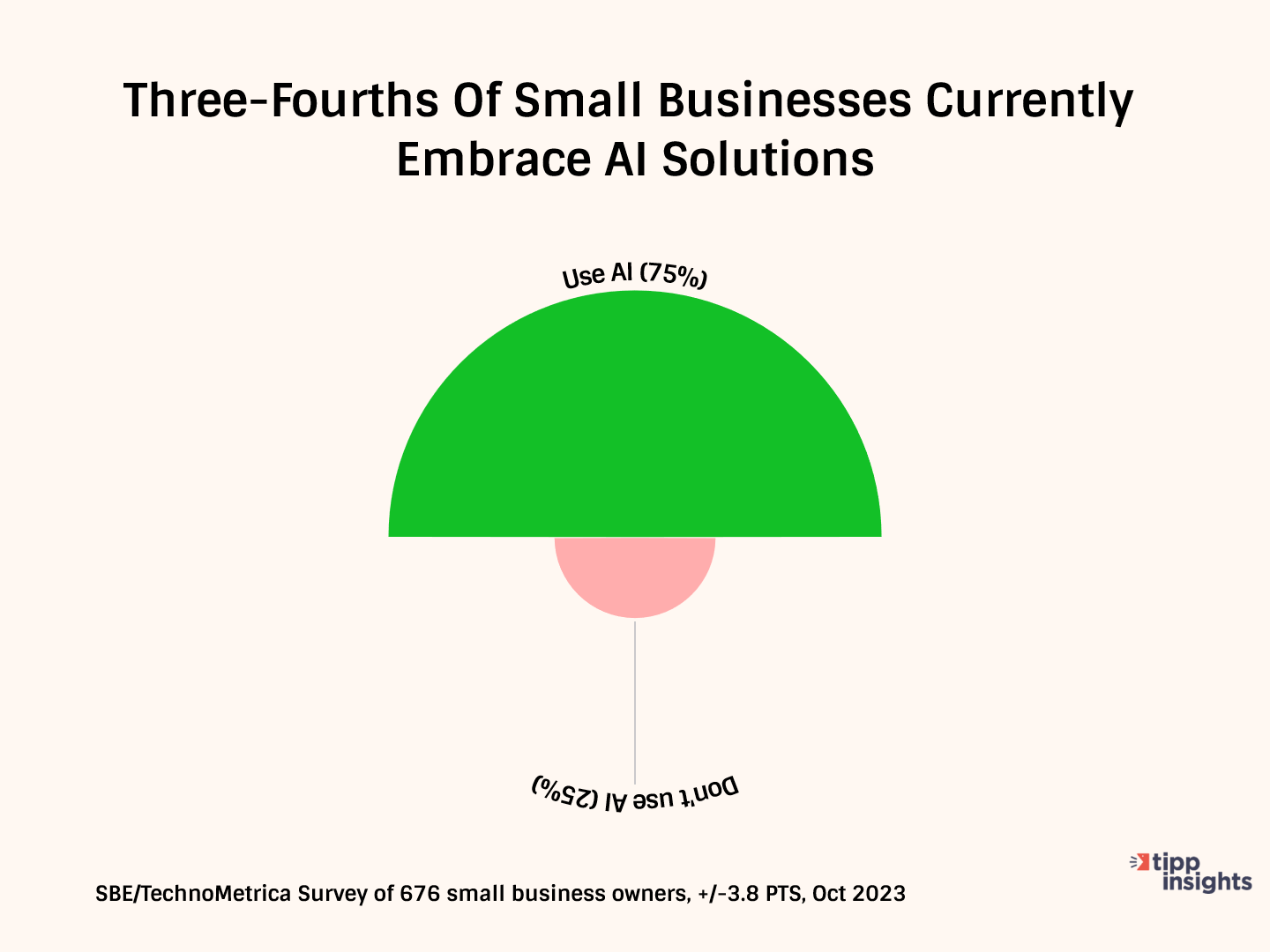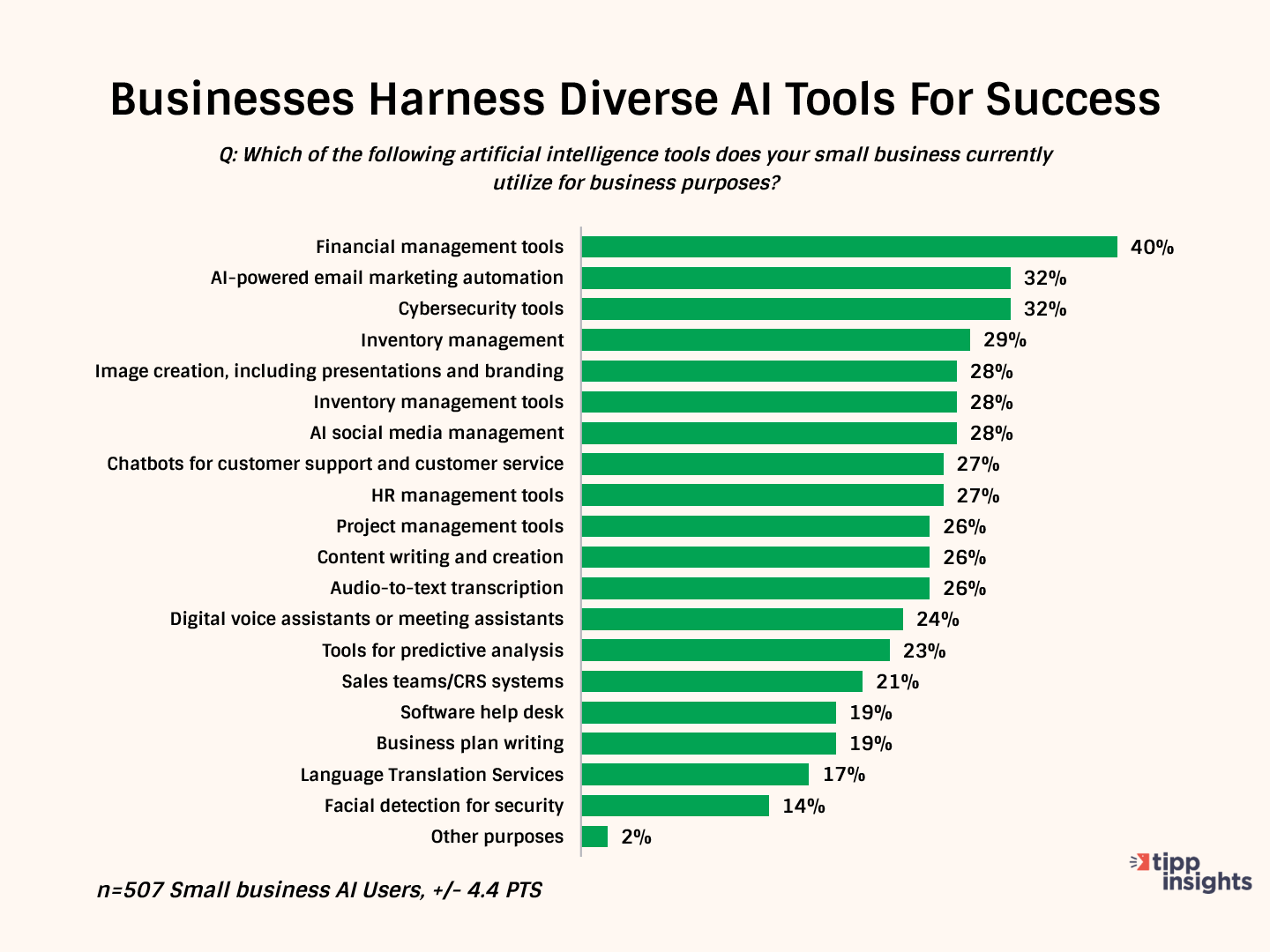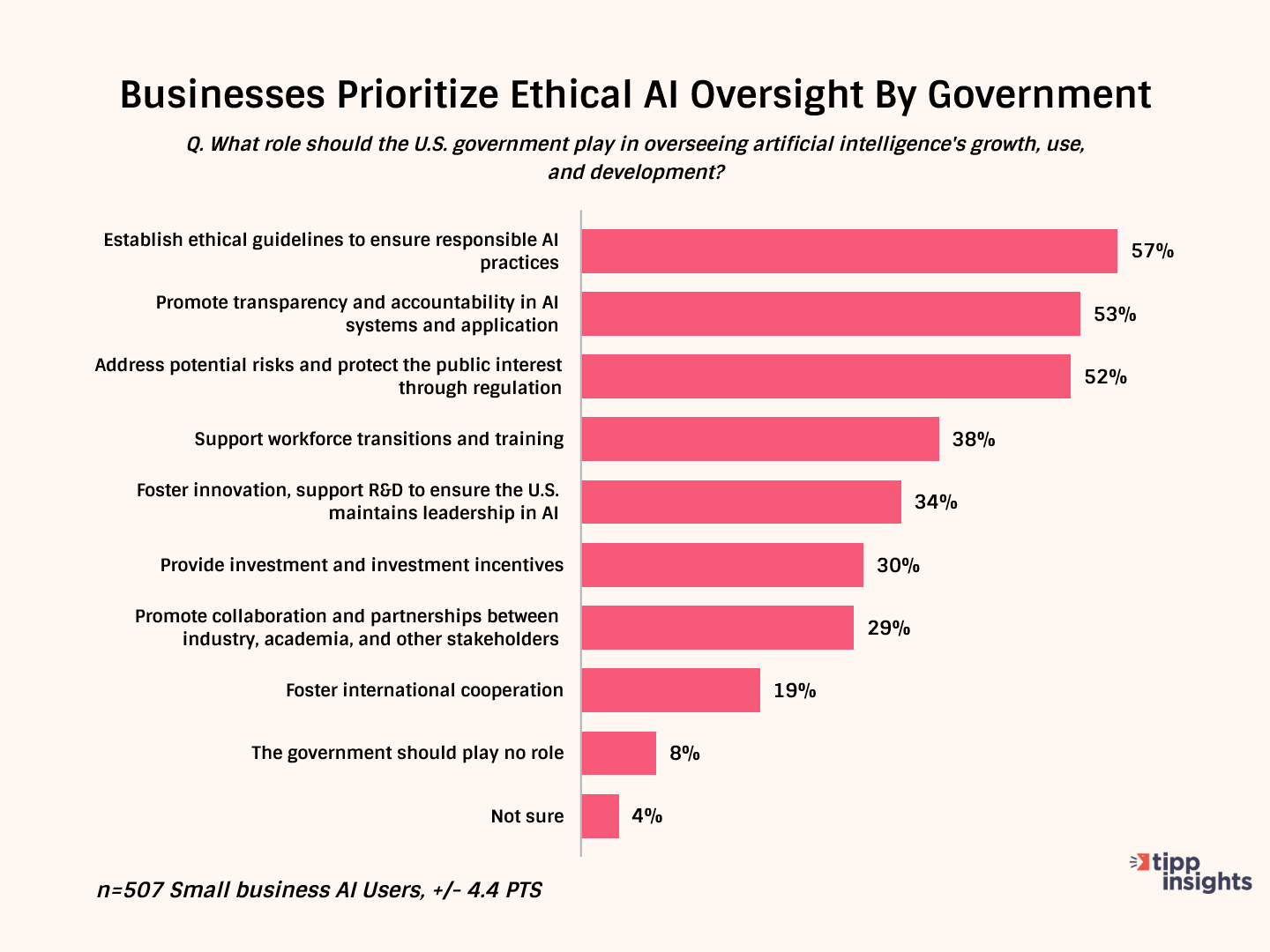- Small businesses embrace AI for a competitive edge in a challenging economy
- AI helps business owners address challenges like inflation and labor shortages, driving profits, resource redirection, new investments and growth
- AI is being widely used in financial management, email marketing, cybersecurity, and inventory management, along with a host of tools for branding, marketing and sales
- Government’s role should be balanced, encouraging innovation while providing leadership on ethical guidance, transparency and accountability
The adoption of artificial intelligence (AI) tools by small businesses has skyrocketed as they continue to seek solutions that help them navigate high costs and capital constraints, make better decisions, and deal with skilled labor shortages that hamper operating capacity. These tools are enabling small businesses to save significant time and money while boosting productivity and competitiveness.
These insights are based on a recent SMALL BUSINESS AI ADOPTION SURVEY 2023, conducted by TechnoMetrica for the SBE Council. Six hundred seventy-six (676) small business owners participated in the survey, and 507 self-identified as using AI within their businesses, employing 2-99 employees.

Small business owners have rapidly embraced AI, and the range of tools and applications is helping them boost profitability, productivity, and competitiveness while facing the stiff challenges posed by inflationary pressures, skilled labor shortages, heightened competition with larger businesses, and capital constraints during a period of high-interest rates and shrinking availability.
93% of small business owners agree that AI tools offer cost-effective solutions that drive savings and improve profitability in the current business environment. Given their excellent return on investment, it is no surprise that 83% of small business owners plan to continue investing in AI over the next 12 months, with 31% opting for significant investments.
A detailed analysis of the survey presents a promising picture for adopting and implementing AI among small businesses in sectors as diverse as retail, beauty, health, and logistics.
The substantial uptick in adopting AI technology reflects small business owners' growing recognition of the technology's transformative potential. A significant 48% of small businesses have embraced AI tools within the last year, and the survey found that 29% have been utilizing AI solutions for one to two years. As AI becomes more accessible and user-friendly, small businesses leverage these tools to remain competitive and establish long-term profitability and sustained growth.
AI is easing key pain points for small businesses, and owners report that AI-powered tools enable their workforce to focus on high-value projects and tasks, providing opportunities for growth and a more meaningful work experience. One small business owner opined, "AI has de-stressed the workplace."
Small business owners report that by leveraging AI tools, they save not only time and capital but also experience significant benefits, including revenue-generating enhancements, such as:
- Redirecting time and employee resources to higher-value work (41%)
- Investing in innovative solutions for customer engagement and retention (39%)
- Investing in new equipment and technology (37%)
- Keeping prices stable for customers (36%)
- Pursuing growth opportunities for the business (34%)
- Setting aside capital for emergency/other purposes (25%)
- Increasing wages and benefits (25%)
According to a small business owner:
AI automates repetitive tasks, freeing up employees to focus on more strategic and value-added activities, this leads to significant increase in efficiency and productivity. AI tools also help develop new products and services, and help our business analyze large amount of data to identify patterns and trends.
SBE Council chief economist Raymond J. Keating opines that time saved or better utilized by small business owners and employees – estimated to total around 6.33 billion hours - translates into approximate annual savings of $273.5 billion.
75% of small businesses utilize AI tools for an expansive range of business functions. AI-powered tools and solutions are used in nearly 20 different areas to support business operations. The most widely used AI tools among small businesses are:
- Financial management (40%)
- AI-powered email marketing automation (32%)
- Cybersecurity (32%)
- Inventory management (28%)

Advancements in AI tools and their rapid adoption open up new branding, marketing, customer engagement, and sales opportunities. Entrepreneurs, businesses, employees, and consumers benefit immensely from the range of support and services provided by AI-powered solutions for marketing, sales, and customer service needs.
Small businesses are using AI for a wide range of tools, according to the SBE Council AI Adoption Survey 2023, including:
- Email marketing automation (32%)
- Image creation for logo and branding material (28%)
- Social media management (28%),
- Chatbots for customers support and service (27%)
- Content writing and creation (26%)
- Audio-to-text transcription (26%)
- Tools for predictive analysis (23%),
- Sales team support and CRS systems (21%)
- Language translation (17%)
Small business owners cite several compelling factors for embracing AI. While a key motivator is peer influence, personal research coupled with their comfort with technology (54%), the prospect of enhanced efficiency leading to time and cost savings (51%), the need to stay competitive (29%), and concerns about inflation (26%) are also driving factors. Additionally, high labor costs (25%) and the need to compensate for a shortage of skilled labor (19%) were also influential in propelling the adoption of AI in their businesses.
Even as business owners benefit from increased efficiency and cost savings, they are aware of the potential risks associated with artificial intelligence tools and services. They acknowledge the importance of addressing ethical concerns, biases, and unintended consequences to ensure responsible development and deployment of AI systems. Many look to the government to provide clear guidelines and adequate checks and balances, while some counter that too much regulation will stifle innovation.
A small business owner cautioned:
As for government regulation of AI…it's crucial that regulation doesn't stifle innovation or U.S. competitiveness in the global AI landscape. It's about striking a balance - ensuring ethical AI use and development without hindering technological progress and application.
85% of small businesses agree that the government must balance regulation and innovation in AI. The top three areas small business owners identified for the government to play a role include
- Establishing ethical guidelines (57%)
- Promoting transparency and accountability (53%)
- Addressing potential risks (52%)

The positive impact of AI-powered solutions is evident in the real savings and enhanced productivity small businesses have gained from adoption. AI is revolutionizing how small businesses operate, adapt, and innovate, from streamlined operations to improved customer engagement and retention. As small businesses increasingly leverage AI and gain competitive benefits from such usage, government policy must continue to support innovation and the affordability of such tools. Groundless fears must not drive policy, and regulators and elected officials would be wise to heed the balanced approach supported by entrepreneurs, which prioritizes the establishment of ethical guidelines and frameworks that promote transparency and accountability.
Karen Kerrigan is president & CEO of the Small Business & Entrepreneurship Council.









